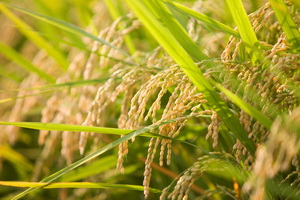
Lack of 'Happiness' Hormone Makes Rice Plants Less Attractive to Insects
May 23, 2018| |
 Experts at Newcastle University in the United Kingdom have discovered that inhibiting the production of serotonin - the happiness hormone - in rice plants increases their resistance to two of the world's most destructive and costly insect pests in rice production: brown plant-hopper and striped stem borer. Using gene editing techniques on rice plants to switch off the serotonin-producing gene, the team found the plants also produced higher levels of salicylic acid.
Experts at Newcastle University in the United Kingdom have discovered that inhibiting the production of serotonin - the happiness hormone - in rice plants increases their resistance to two of the world's most destructive and costly insect pests in rice production: brown plant-hopper and striped stem borer. Using gene editing techniques on rice plants to switch off the serotonin-producing gene, the team found the plants also produced higher levels of salicylic acid.
In humans, serotonin helps regulate moods, boost appetite, regulate digestion, and helps with sleep and memory. In plants, serotonin is involved in growth and development, while it helps insects seek out resources and food.
Analyzing the plant's response to insect attack, the team found both serotonin and salicylic acid were produced in response to an infestation, but supressing serotonin production made the rice plants more pest-resistant. They also found that disabling the gene responsible for making serotonin increases levels of salicylic acid in the plant and increase its resistance.
For more information, read the news article from Newcastle University.
| |
Biotech Updates is a weekly newsletter of ISAAA, a not-for-profit organization. It is distributed for free to over 22,000 subscribers worldwide to inform them about the key developments in biosciences, especially in biotechnology. Your support will help us in our mission to feed the world with knowledge. You can help by donating as little as $10.
-
See more articles:
-
News from Around the World
- Farmers and Experts Look Forward to Bt Cotton Adoption to Revive Textile Industry in Kenya
- Study Explains How Pathogen Proteins Work Together to Attack Plants
- Plant Peptide Plays a Role in Salt Stress Tolerance
- Legislators Bat for the Advancement of Agri-biotech in PH
- GM Meets GE in Camelina Field Trials
- Spanish Scientists Find Crop Genes to Adapt to Climate Change
- Study Says GM Potato Can Help Cut Pesticide Use by Up to 90%
- Lack of 'Happiness' Hormone Makes Rice Plants Less Attractive to Insects
-
Research Highlights
- OsMTP11 Gene Regulates Magnesium Transport and Homeostasis in Rice
- OXI1 Kinase Involved in Aphid Resistance in Arabidopsis
- Researchers Find Potential Gene for Enhancing Oil Content of Canola
-
Beyond Crop Biotech
- Therapeutic Nanoparticles Could Help Save Sickly Crops
- Green Tissue-Specific Promoters Used to Alter Lignin Production in Switchgrass
-
Announcements
- Biotechnology Conference 2018
-
Plant
- CRISPR-edited Rice Plants Get Major Boost in Grain Yield
- CRISPR-Cas9 Used to Knock Out Genes in Robusta Coffee
- Researchers Test TALEN Genome Editing on Peanut
- Argentine Scientists Develop Non-Browning Potatoes Using CRISPR
-
Read the latest: - Biotech Updates (January 14, 2026)
- Gene Editing Supplement (December 17, 2025)
- Gene Drive Supplement (February 22, 2023)
-
Subscribe to BU: - Share
- Tweet
